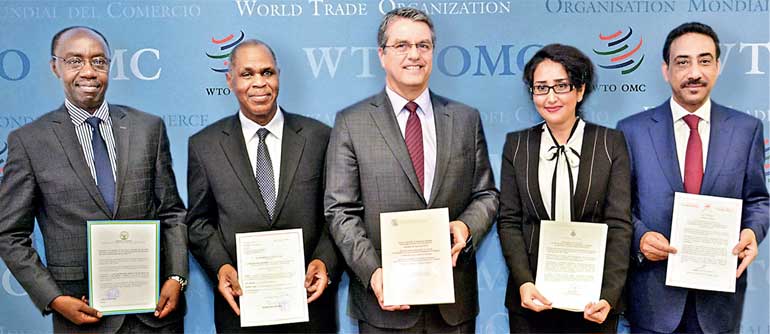Friday Feb 27, 2026
Friday Feb 27, 2026
Monday, 27 February 2017 00:37 - - {{hitsCtrl.values.hits}}

WTO Director-General Roberto Azevêdo with (from left): Ambassador François Xavier Ngarambe of Rwanda, Ambassador Malloum Bamanga Abbas of Chad, Ambassador Saja Majali of Jordan and Abdulla Nasser Musallam Al Rahbi of Oman presenting their countries’ TFA instruments of acceptance
The International Chamber of Commerce (ICC) has welcomed the entry into force of the World Trade Organisation’s (WTO) Trade Facilitation Agreement (TFA) – a landmark global trade agreement which could provide a boost to global trade flows of over $ 1 trillion.
WTO’s Trade Facilitation Agreement (TFA) entered into force, with four new ratifications of the agreement announced recently. The TFA has been ratified by more than two-thirds of the WTO membership which means that the agreement now becomes an official part of the multilateral trading system.
The TFA – the first multilateral trade agreement to enter into force in over two decades – aims to make trade easier and simpler by cutting red-tape at borders. ICC has estimated that the deal could support the creation of some 20 million jobs worldwide – the vast majority in developing countries.
ICC Chairman Sunil Bharti Mittal said: “The entry into force of the TFA is a watershed moment for global trade. The reality today is that many small businesses find themselves unable to trade internationally due to complex customs requirements. The TFA can help ensure that, for the first time, all companies – regardless of size or location – can benefit from global trade. The entry into force of the agreement could not come at a more important moment given the imperative to make global growth more inclusive.” ICC has been a leading proponent of the TFA, playing a key role in the 2013 negotiations that led to the agreement and working closely with the WTO and other international organisations to coordinate and support the deal’s implementation.
ICC Secretary General John Danilovich said: “ICC has tirelessly championed the TFA because we know that making trade easier through simple customs reforms can provide a major boost to small business growth. It’s estimated that the TFA could increase SME exports by 80% in some economies.”
ICC is actively supporting the implementation of the TFA through the Global Alliance for Trade Facilitation—a major public-private partnership supported by a number of donor governments and international businesses. The Alliance is currently rolling out trade facilitation projects in Colombia, Ghana, Kenya and Vietnam based on TFA standards.
ICC Sri Lanka Chairman Keerthi Gunawardane said: “The Trade Facilitation Agreement come in to force will bring much benefits to Sri Lanka. According to the Research by the World Economic Forum suggests the biggest benefits of the TFA would be for SMEs and developing and emerging economies, where businesses and consumers would reap the benefits of greater integration into global markets. TFA implementation could trigger a 60% to 80% increase in cross-border SME sales in some economies. We should have an early start to bring more benefits to the SME’s of Sri Lanka. ICC Sri Lanka is in the process of working with the Global Alliance partners to support the Sri business in Sri Lanka.”
The TFA represents an immense opportunity to make trade easier and less costly for business – especially for small- and medium-sized companies – but it is up to each country to determine how ambitious its implementation of the agreement will be.